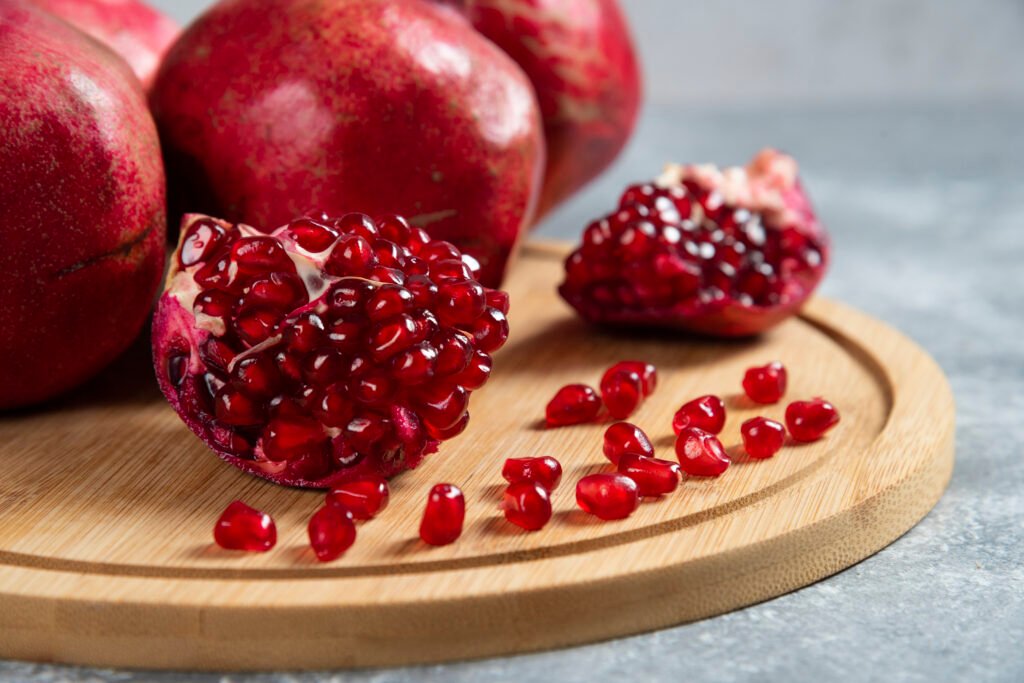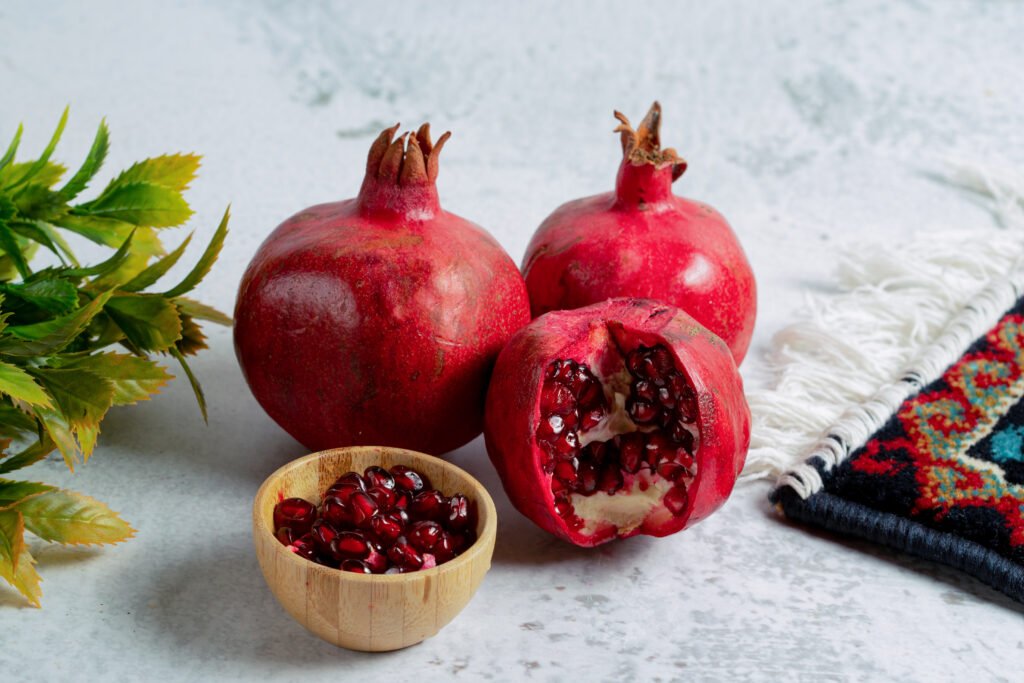
INCREASE YOUR IMMUNITY WITH POMEGRANTE
Pomegranates are not just a fruit; they are a powerhouse of nutrition and health benefits. Known for their ruby-red seeds and tangy-sweet flavor, pomegranates have been celebrated for centuries in various cultures as a symbol of health and vitality. With modern research validating these ancient claims, it’s clear that pomegranates can play a pivotal role in boosting your immune system. This blog explores why pomegranates are so beneficial for immunity and how you can incorporate them into your daily diet.
Nutritional Profile of Pomegranate
Pomegranates are rich in essential nutrients that support overall health. A single pomegranate is packed with:
Vitamins: Particularly high in Vitamin C, Vitamin K, and some B vitamins like folate.
Minerals: Contains potassium, magnesium, and phosphorus.
Antioxidants: Polyphenols such as punicalagins, ellagic acid, and anthocyanins are abundant.
Dietary Fiber: Promotes gut health and aids digestion.
Each of these components contributes to a robust immune system, making pomegranates an ideal choice for those looking to strengthen their defenses.
1. Antioxidants: Nature’s Defense Mechanism
One of the standout features of pomegranates is their exceptionally high antioxidant content. Antioxidants are molecules that fight free radicals, unstable atoms that can cause cellular damage and contribute to chronic diseases. Pomegranates are particularly rich in punicalagins, a type of polyphenol with potent antioxidant properties.
Antioxidants not only protect the body from oxidative stress but also support the immune system by ensuring that cells function optimally. By neutralizing harmful molecules, they reduce the risk of inflammation and chronic illnesses, which can compromise immunity.
2. Vitamin C: The Immunity Booster
Vitamin C is one of the most well-known nutrients for immunity, and pomegranates are an excellent source. This water-soluble vitamin is crucial for the production of white blood cells, which are the body’s primary defense against infections. Additionally, Vitamin C enhances the function of phagocytes, cells that “eat up” harmful bacteria and viruses.
Consuming pomegranates regularly ensures that your body receives an adequate supply of Vitamin C, helping to fend off colds, flu, and other infections.
3. Anti-inflammatory Properties
Chronic inflammation is a significant contributor to weakened immunity. Pomegranates are rich in anti-inflammatory compounds that help reduce inflammation throughout the body. The punicalagins and ellagic acid found in pomegranates have been shown to inhibit inflammatory pathways, making them particularly beneficial for individuals with autoimmune disorders or chronic diseases.
By keeping inflammation in check, pomegranates ensure that your immune system can focus on fighting off pathogens rather than dealing with internal issues.
4. Antimicrobial Effects
Pomegranate extract has demonstrated impressive antimicrobial properties in scientific studies. These properties help combat harmful bacteria, viruses, and even certain fungi. For instance, research suggests that pomegranate can inhibit the growth of bacteria like Escherichia coli and Staphylococcus aureus. Additionally, its antiviral properties may help in preventing respiratory infections.
Including pomegranates in your diet can act as a natural safeguard against common infections, particularly during flu season.
5. Supports Gut Health
A healthy gut is the cornerstone of a strong immune system. The gut houses trillions of microbes that play a critical role in immune regulation. Pomegranates, with their high fiber content and prebiotic properties, support the growth of beneficial gut bacteria.
Moreover, pomegranate compounds like ellagitannins are converted by gut microbes into urolithins, which have additional anti-inflammatory and antimicrobial effects. This symbiotic relationship between pomegranates and gut microbes amplifies their immune-boosting potential.
6. Rich in Polyphenols for Longevity
Polyphenols in pomegranates not only improve immunity but also promote overall longevity. These compounds enhance the activity of natural killer (NK) cells, a type of white blood cell that destroys virus-infected and cancerous cells. This dual action—supporting both immediate immunity and long-term health—makes pomegranates a truly remarkable fruit.
7. Helps Combat Oxidative Stress in Athletes
For individuals engaged in regular physical activity or high-intensity workouts, oxidative stress can weaken the immune system. Pomegranate juice has been shown to reduce markers of oxidative damage in athletes, helping to maintain their immune function. This makes it an ideal post-workout drink for those looking to stay healthy and active.
8. Enhances Cardiovascular Health
A healthy heart is essential for a strong immune system, and pomegranates contribute significantly to cardiovascular health. Rich in antioxidants and nitrates, pomegranates improve blood flow and reduce blood pressure. This, in turn, ensures that immune cells are efficiently transported throughout the body to combat infections.
9. Protects Against Aging-Related Immunity Decline
As we age, our immune system naturally weakens. Pomegranates, with their anti-aging properties, can help slow this decline. Their antioxidants reduce cellular damage and support the regeneration of immune cells, keeping the body’s defenses strong even in later years.

How to Incorporate Pomegranate into Your Diet
Adding pomegranate to your daily routine is easier than you think. Here are some simple and delicious ways to enjoy this superfood:
1. Eat the Seeds (Arils)
The easiest way to enjoy pomegranate is by eating the seeds. They’re a delightful snack on their own or can be added to yogurt, oatmeal, or cereal for a nutritional boost.
2. Drink Pomegranate Juice
Pomegranate juice is a convenient way to enjoy the fruit’s benefits. Opt for 100% pure, unsweetened juice to maximize the health benefits and avoid added sugars.
3. Toss into salads
Pomegranate seeds add a burst of flavor and texture to salads. Pair them with leafy greens, nuts, and a light vinaigrette for a refreshing and immunity-boosting meal.
4. Blend Into Smoothies
Add pomegranate seeds or juice to your favorite smoothie recipes for a tangy twist. Combine with other fruits like berries, bananas, and spinach for a nutriendence drink.
5. Use as a Garnish
Sprinkle pomegranate seeds over desserts , roasted vegetables, or grilled meats for an extra layer of flavor and nutrition.
6. Experiment with cooking
Pomegranate molasses is a popular ingredient in Middle Eastern cuisine and can be used to glaze meats, enhance sauces, or add depth to stews.
Tips for Selecting and Storing Pomegranates
- Selecting Pomegranates: Look for fruits that are heavy for their size with smooth, unbroken skin. A vibrant red color is often a sign of ripeness.
- Storing Pomegranates: Whole pomegranates can be stored at room temperature for about a week or in the refrigerator for up to two months. Once the seeds are extracted, store them in an airtight container in the fridge for upto five days or freeze them for longer storage.
Conclusion
Pomegranates are a nutritional treasure trove with immense potential to enhance your immune system. Form their rich antioxidant content to their anti-inflammatory and antimicrobial properties, pomegranates address multiple facts of immunity and overall health. Whether you enjoy them fresh, juiced, or as part of a recipe, incorporating pomegranates into your daily diet is a delicious and effective way to stay healthy.
Embrace the power of this ancient fruit and give your immunity the boost it deserves. Start today, and let the humble pomegranate become your ally in the journey towards better health and vitality.
For more health insights follow @shikaagarwal02 on instagram
or for direct consultation whatsapp at +91 82400 22632, +91 98311 91518.
